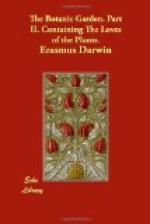And in one respect, I believe, the English language serves the purpose of poetry better than the antient ones, I mean in the greater ease of producing personifications; for as our nouns have in general no genders affixed to them in prose-compositions, and in the habits of conversation, they become easily personified only by the addition of a masculine or feminine pronoun, as,
Pale
Melancholy sits, and round her throws
A
death-like silence, and a dread repose.
Pope’s
Abelard.
And secondly, as most of our nouns have the article a or the prefixed to them in prose-writing and in conversation, they in general become personified even by the omission of these articles; as in the bold figure of Shipwreck in Miss Seward’s Elegy on Capt. Cook:
But
round the steepy rocks and dangerous strand
Rolls
the white surf, and SHIPWRECK guards the land.
Add to this, that if the verses in our heroic poetry be shorter than those of the ancients, our words likewise are shorter; and in respect to their measure or time, which has erroneously been called melody and harmony, I doubt, from what has been said above, whether we are so much inferior as is generally believed; since many passages, which have been stolen from antient poets, have been translated into our language without losing any thing of the beauty of the versification.
B. I am glad to hear you acknowledge the thefts of the modern poets from the antient ones, whose works I suppose have been reckoned lawful plunder in all ages. But have not you borrowed epithets, phrases, and even half a line occasionally from modern poems?
P. It may be difficult to mark the exact boundary of what should be termed plagiarism: where the sentiment and expression are both borrowed without due acknowledgement, there can be no doubt;—single words, on the contrary, taken from other authors, cannot convict a writer of plagiarism; they are lawful game, wild by nature, the property of all who can capture them;—and perhaps a few common flowers of speech may be gathered, as we pass over our neighbour’s inclosure, without stigmatizing us with the title of thieves; but we must not therefore plunder his cultivated fruit.
The four lines at the end of the plant Upas are imitated from Dr. Young’s Night Thoughts. The line in the episode adjoined to Cassia, “The salt tear mingling with the milk he sips,” is from an interesting and humane passage in Langhorne’s Justice of Peace. There are probably many others, which, if I could recollect them, should here be acknowledged. As it is, like exotic plants, their mixture with the natives ones, I hope, adds beauty to my Botanic Garden:—and such as it is, Mr. Bookseller, I now leave it to you to desire the Ladies and Gentlemen to walk in; but please to apprize them, that, like the spectators at an unskilful exhibition in some village-barn, I hope they will make Good-humour one of their party; and thus theirselves supply the defects of the representation.




